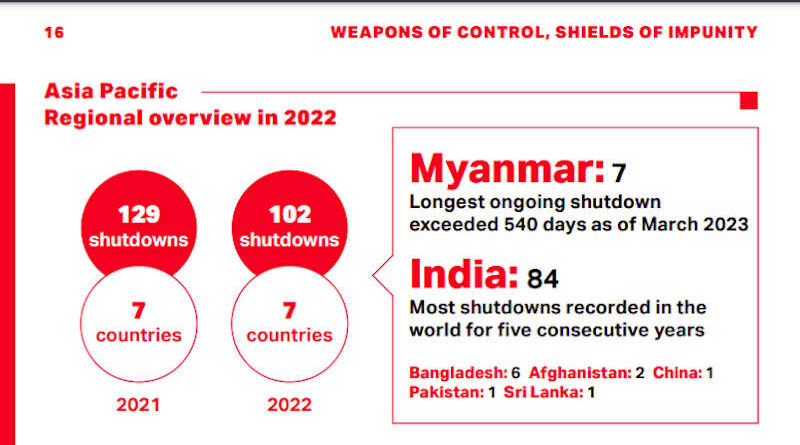India Is the Biggest Offender for Internet Shutdowns: Global Report

India Is the Biggest Offender for Internet Shutdowns: Global Report
India, which was responsible for 84 Internet shutdowns in 2022, remains the country with the highest number of recorded shutdowns in the world — for the fifth consecutive year.
This is among the findings of a new global report that records Internet shutdowns in different parts of the world. The report says that the Indian authorities disrupted internet access at least 49 times in Jammu and Kashmir (J&K) due to political instability and violence, including a string of 16 back-to-back orders for three-day-long curfew style shutdowns in January and February 2022.
Launched on February 28, Access Now and the #KeepItOn coalition’s new report, Weapons of control, shields of impunity: Internet shutdowns in 2022, reveals and unpacks the global resurgence of internet shutdowns over the span of one catastrophic year for human rights.
Since Access Now started documenting shutdowns in 2016, India has accounted for approximately 58% of all shutdowns documented in its Shutdown Tracker Optimization Project (STOP) database. It says the responsibility of Indian states for the majority of shutdowns globally is impossible to ignore and a deep problem on its own.
In 2021, according to the report, around 80% of all shutdowns in India were in J&K, compared to 58% in 2022. Authorities in regions across the country are increasingly resorting to this repressive measure, inflicting shutdowns on more people in more places.
Setting aside J&K, authorities in West Bengal (7) and Rajasthan (12) imposed more shutdowns than authorities in other regions in India, responding to protests, communal violence, and exams with disruptions that impacted the daily lives of millions of people for hundreds of hours in 2022.
Although Access Now counted fewer than 100 shutdowns in India for the first time since 2017, it says it is not convinced Indian authorities have embarked on the path toward positive, sustained change with regard to digital rights.
Legal challenges against shutdowns, fewer mass protests in the aftermath of the Covid-19 pandemic, and the sustained and increasing crackdown on dissent may have increased administrative friction or reduced the incentives for authorities to impose shutdowns.
At the same time, the government’s persistent failure to publicly release shutdown orders in violation of the Supreme Court’s judgment, and the technical challenges in monitoring, tracking, and recording shutdowns — in particular in communities where shutdowns are an emerging issue — likely mean we have not yet recorded all disruptions, the report says.
In addition, according to the report, the proposed Draft Indian Telecommunication Bill, which would empower central and state governments with unrestricted powers to impose shutdowns when “necessary and expedient,” signals the government’s intention to continue down this troublesome path, violating fundamental rights of expression and assembly and providing opportunities to cover up human rights abuses.
In addition to shutdowns, according to the report, Indian authorities have honed their playbook by increasing censorship, blocking websites, and issuing takedown orders to social media platforms.
Access Now is a non-profit organization founded in 2009 with a mission to defend and extend the digital civil rights of people around the world.




